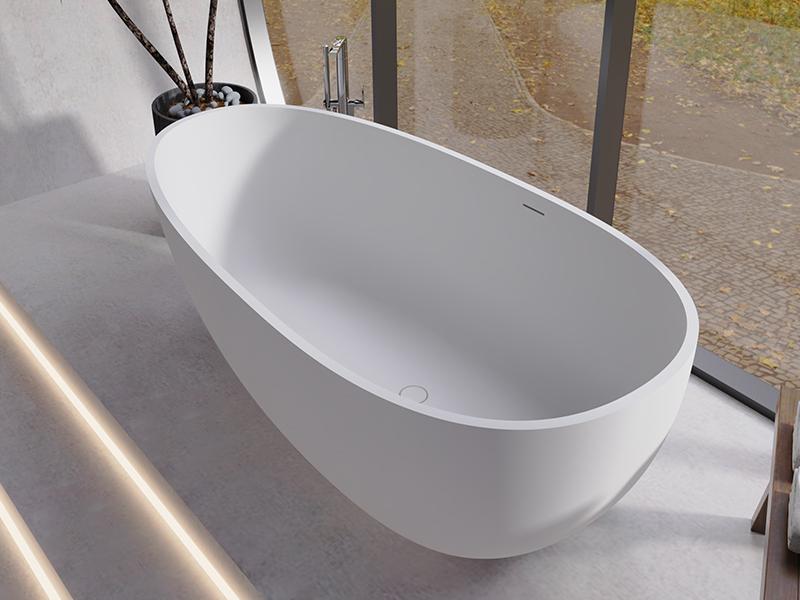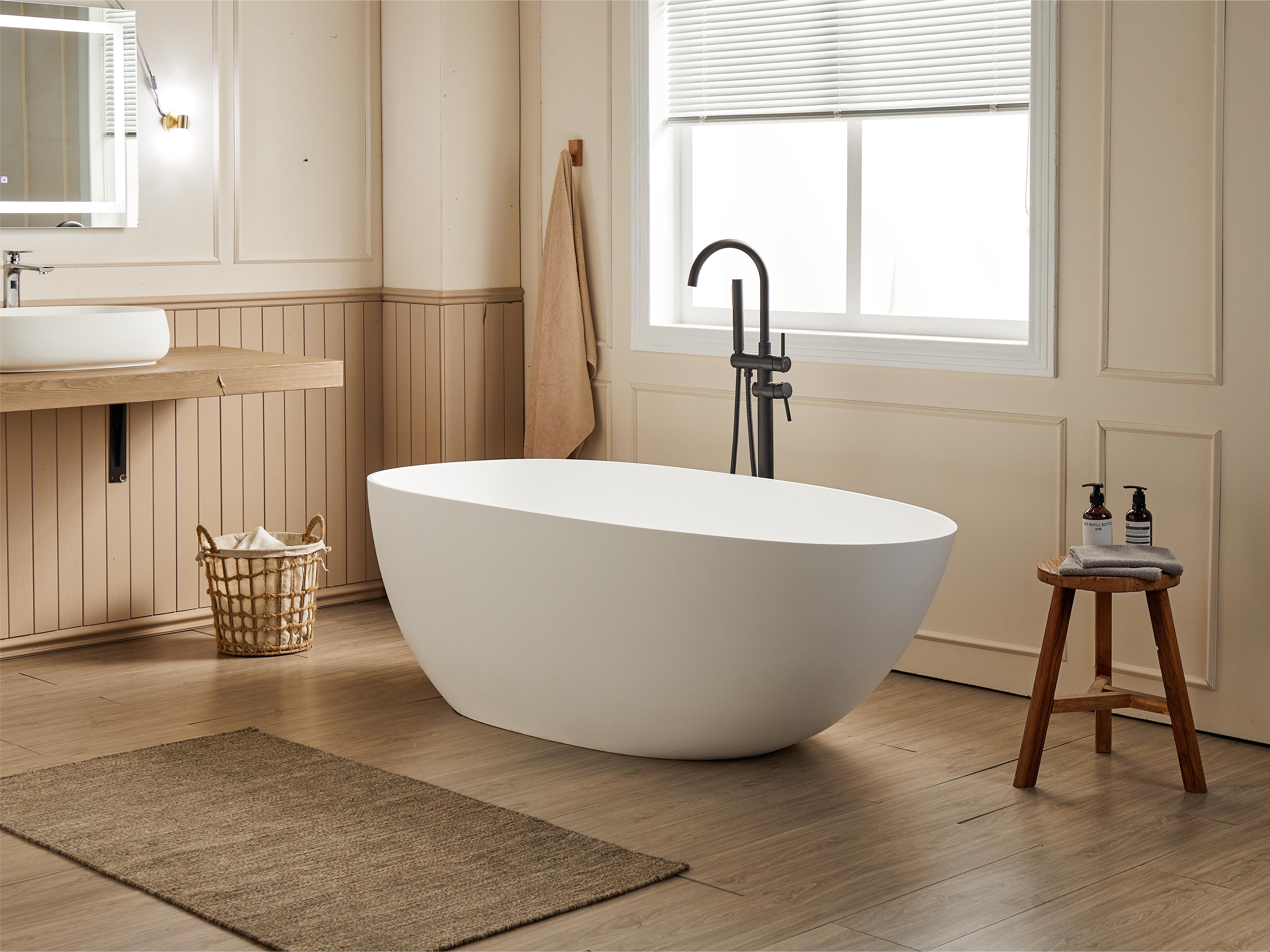The Best Solid Surface Bathtub: A Guide to 5 Key Aspects
Introduction
When it comes to creating the perfect bathroom oasis, choosing the best solid surface bathtub is crucial.
We agree that a high-quality bathtub can elevate your bathroom's functionality and style. At Cpingao, we’re committed to helping you make informed decisions about this key fixture.
In this article, we’ll dive into five essential aspects of the best solid surface bathtubs.
We’ll discuss what makes their surface exceptional, their durable design, and their ability to resist cracking.
Additionally, we’ll compare materials like acrylic and fiberglass, and explain the difference between stone resin and solid surface.
By exploring these five aspects, you’ll gain a clear understanding of what to look for in a solid surface bathtub and how to choose a design that balances aesthetics with long-term performance. Let’s get started!

1. What is the best surface for a bathtub?
Acrylic is durable but can scratch easily compared to cast iron. It retains heat better than fiberglass, keeping water warm for 15-20 minutes.
Affordable, it typically ranges from $1,000 to $2,000, making it ideal for budget-conscious buyers.
- Porcelain Enamel Cast Iron Bathtub
Highly durable, cast iron lasts over 50 years, though it can rust if the enamel cracks.
It excels at heat retention, keeping water hot for over 30 minutes. Heavy and costly ($1,500-$5,000), it’s ideal for long baths and classic designs.
- Cast Iron Bathtub (Without Enamel)
Durable and scratch-resistant, this tub also suppresses noise, providing a quieter experience.
It’s also priced higher ($1,500-$5,000) but offers premium durability and soundproofing.
- Quartz Resin Bathtub
Quartz resin is highly durable, resistant to impact, and retains heat for 20-25 minutes.
It’s a premium choice, with prices ranging from $2,000 to $6,000, ideal for luxury buyers seeking long-lasting performance.
- Fiberglass Bathtub
Fiberglass is the least durable and typically lasts 5-10 years.
It’s the most affordable, priced between $500 and $1,500, but offers lower longevity and scratch resistance.

2.Are Solid Surface Tubs Worth It?
Solid surface bathtubs offer a combination of durability, aesthetic appeal, and customization, making them a popular choice for luxury bathrooms.
Here’s a breakdown of why they may—or may not—be worth the investment:
Advantages:
- Durability & Scratch Resistance:Made from a blend of resin, minerals, and acrylic, solid surface tubs are highly durable and resistant to scratches, making them suitable for long-term use. They are also non-porous, preventing mold and bacteria growth.
- Aesthetic Appeal & Customizability:These tubs offer a smooth, seamless finish and can mimic the look of high-end natural stones like marble. Custom colors and shapes are available, perfect for personalized bathroom designs.
- Low Maintenance:Solid surface bathtubs are easy to clean with just soap and water, without the need for harsh chemicals. Their smooth surface resists stains and scale buildup.
Disadvantages:
- High Cost:Solid surface tubs are significantly more expensive than acrylic or fiberglass, typically priced between $1,500 and $4,000. Installation costs are also higher due to their weight and complexity.
- Impact Vulnerability:While durable, these bathtubs can crack under heavy impact. Minor damage can be repaired, but larger cracks may need professional fixing.
- Heavy Weight:Solid surface bathtubs are heavier, requiring extra consideration for the floor's load-bearing capacity.
Application:
Ideal for high-end residential and commercial spaces like hotels and spas, solid surface tubs combine luxury with durability, offering a premium experience with easy maintenance.

3.What is the Best Bathtub that Won’t Crack?
When choosing a bathtub that won’t crack, durability is key. Below are the best bathtub options known for their crack resistance:
- Cast Iron
Cast iron bathtubs are renowned for their durability. The enameled surface is highly resistant to cracks, chips, and stains, ensuring a long lifespan with proper care.
These tubs offer excellent heat retention, making them perfect for extended soaks.
However, they are heavy and may require additional structural support during installation.
Despite the weight, they remain one of the most durable options available.
- Solid Stone
Solid stone bathtubs, made from materials like granite or marble, are extremely strong and crack-resistant.
Their luxurious appearance and natural strength make them ideal for high-end bathrooms.
However, these tubs are heavy and expensive, requiring a solid foundation for installation.
Their longevity and crack resistance make them an excellent investment for those seeking ultimate durability.
- Stone Resin
Stone resin combines minerals and polymer resins, offering an affordable alternative to solid stone.
These tubs are crack-resistant, durable, and retain heat well, providing a luxurious look without the hefty price tag.
However, like solid stone, stone resin bathtubs can be quite heavy and may require floor support during installation.
Conclusion
For the best combination of crack resistance and longevity, cast iron and solid stone bathtubs lead the pack, though they are heavier and more expensive. Stone resin offers a more affordable, yet still durable, alternative.

4.Which is Stronger: Acrylic or Fiberglass Tubs?
When comparing acrylic and fiberglass tubs, acrylic generally outshines fiberglass in terms of strength, durability, and long-term performance.
Acrylic Tubs
Acrylic tubs are made from solid sheets reinforced with fiberglass, creating a flexible, resilient surface that resists cracks, chips, and scratches.
They also have better heat retention properties, making them more comfortable for long soaks.
Acrylic tubs are perfect for luxurious and high-traffic bathrooms, offering a broader range of designs and finishes.
While they come at a higher price point, their durability and long-lasting performance justify the investment.
Fiberglass Tubs
Fiberglass tubs are made from fiberglass mesh and resin layers, making them lightweight and affordable.
However, they are more prone to damage, such as cracking, yellowing, and staining.
They also offer fewer design options compared to acrylic.
Fiberglass tubs are typically best for budget-friendly renovations, temporary installations, or smaller spaces, such as mobile homes.

5.Is Stone Resin the Same as Solid Surface?
Although stone resin and solid surface share some similarities, they are distinct materials, each with its own characteristics suited for different applications.
Stone Resin
Stone resin combines natural stone particles (such as granite or marble) with resin, creating a durable material with a stone-like appearance.
It is typically used in luxury bathtubs, countertops, and sinks.
Stone resin offers excellent heat retention, scratch resistance, and a premium, heavy feel.
However, it is more expensive and harder to transport due to its high density, making it less cost-effective for certain projects.
Solid Surface
Solid surface, made from acrylic or polyester resins mixed with natural minerals, is known for its seamless design and easy repairability.
This material is non-porous, hygienic, and lighter than stone resin, making it a popular choice for countertops, integrated sinks, and commercial spaces.
While it is more affordable, it has poor heat resistance and is more prone to scratching compared to stone resin.

Conclusion
In this article, we explored the best solid surface bathtubs, focusing on their key attributes, including durability, design, and maintenance.
Among the top contenders, cast iron and solid stone bathtubs stood out for their exceptional durability and crack resistance, though they are more expensive and heavier.
Stone resin bathtubs offered a luxurious feel with better affordability, making them a popular choice for high-end bathroom designs.
On the other hand, solid surface bathtubs were appreciated for their customizability, seamless design, and low-maintenance features, making them a go-to for commercial spaces.
In terms of popularity, stone resin and solid surface bathtubs had a higher purchase rate due to their balance of affordability and luxury.
However, cast iron and solid stone bathtubs, while unusual, continue to attract those seeking long-lasting, premium options.
Welcome to know more detailed information about products in Cpingao:
